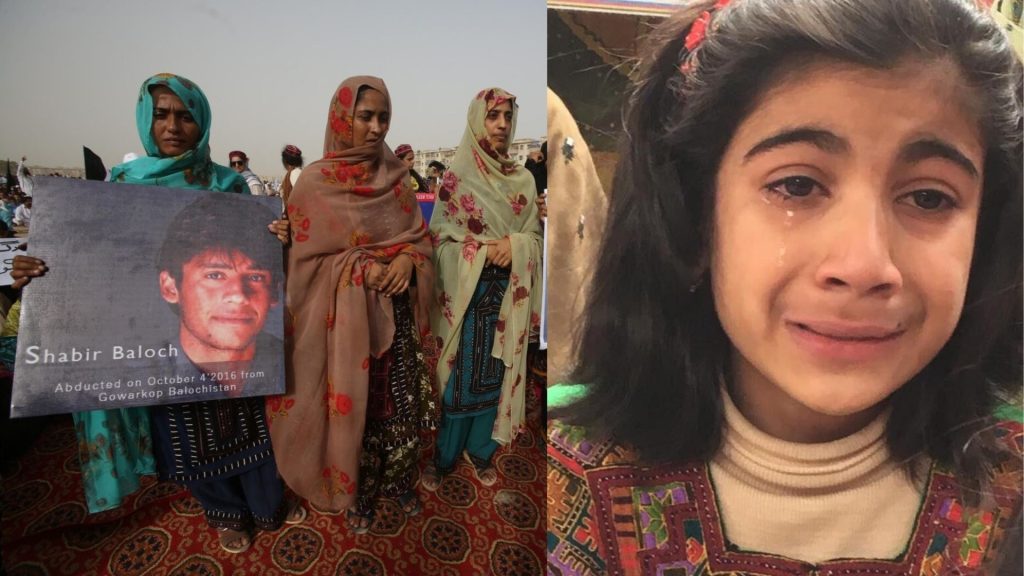“Why don’t you check the Balochistan Post and the Data Collection WhatsApp group?”
My fellow human rights activist Abdullah Abbas was talking to me via WhatsApp to help me so that I could write a story about the abducted Zehri family.
Balochistan Post is an online media outlet that publishes news about Balochistan. “Data Collection” is a WhatsApp group created by young activists in exile to share news about Balochistan’s current human rights situation.
I checked the Balochistan Post and the “Data Collection” group, gathered some information, and began brainstorming on how to write this report and whom to contact for more details if needed.
After a short while, my phone rang. It was Abdullah again. But this time, he was talking about a different family. “Can you add the Sipahan family to your story, please?”
I wanted to tell him, “It’s too depressing to even write about one family, and now you want me to add another one? I can’t…”
Then I thought: It sounds absurd for a human rights activist to say you can’t write about human rights violations.
Therefore, I decided to write something: A couple of years ago, Raheem Zehri moved to Quetta from Zehri, the area of Kuzdar, for a better life. He rode a cart in Quetta city to sell fruits and vegetables to feed his family.
But who knows what the future holds for you?
On the first week of this month, the Pakistani military stormed the house of Raheem. They abducted him along with his wife Rasheeda, his four-year-old son Yahya, his one-year-old daughter Dua, and his 70-year-old-mother Bibi BakshKhatoon.
After a few days, the rest of the abductees were released except Raheem.
The Mother of Raheem told BBC: “When security forces came to our house and started searching and threatening us, I brought the Quran and swore that our family is innocent and we didn’t do anything. But they didn’t listen. Security personnel hit my head three times. I lost consciousness. They dragged us into their vehicles and drove for almost thirty minutes or an hour. I didn’t know where they brought us. They put my grandchildren and me in the same room. But I didn’t know where were my son and daughter-in-law.”
The mother-in-law of Raheem submitted the details of the abduction to Voice for Baloch Missing Persons (VBMP), a non-profit human rights organization run by families of missing people in Balochistan. VBMP and members of the civil society held protests in different parts of Balochistan and condemned the abduction of the Zehri family.
“Family members of Raheem and I went to the police station to register the first information report (FIR),” says Nasarullah Baloch, the chairman of VBMP, to BBC. “When the son of Raheem saw the police personnel at the police station, he cried and said, ‘they will abduct me again.'”
Nasrullah adds, “Mother of Raheem submitted the application of FIR at the police station, but the police didn’t write the report yet.”
It’s not the first time the Zehri family is being punished. This family has been under the shadow of the ruthless military for the past six to seven years.
In 2017 a young cousin of Rasheeda, Zahoor Zehri, was abducted by the military. After eleven days, they killed him and threw his dead body in a desolate place. In 2021, the uncle of Raheeda, Mama Sharif, was shot eight times in broad daylight in his hometown, Zehri, by unknown men. Luckily, he survived. Zehri’s family believed that the culprits were affiliated with local death squads which are run by the military.
While Mama Sharif was staying in the hospital, his son Waseem Tabish and his nephew Liaquat Abdul Rahman were attending to him and were both whisked away by the military. Similarly, one more cousin of Raheeda, Zakaria Baloch, was abducted from Zehri. After one year, Waseem Tabish was killed by Counter Terrorism Department Police (CTD) along with three other abducted persons. The police claimed they were terrorists, but their families denied the accusations. They said that first they were abducted, and then they were killed for these false accusations.
However, the whereabouts and well-being of Raheem, Liaquat and Zakaria are unknown to their family until this date.
It’s not just a tale of the Zehri family. Almost every home in Balochistan is the victim of the unending chain of kidnapping and military cruelties.
Here is one more gloomy anecdote – the story of the Sipahan family.
On February 10, Zaman Jan s/o Sipahan drove his pickup truck from the border of Iran to Turbat, hoping to sell his load of petrol, make some money, and then go home to feed his family.
But he didn’t return home.
His family feared he was whisked away by security forces. They say we have been constantly under attack by the military in the last few years.
“They killed our father and forced us to migrate from our hometown. They abducted Zaman Jan in 2020, along with one more brother and two cousins.” The sister of Zaman Jan was talking to a local Balochi YouTube TV while protesting on China Pakistan Economic Corridor (CPEC) road.
“We don’t leave until they bring my brother back,” she continued.
But instead of releasing Zaman Jan, the military beat the peaceful women and children and charged them to end the protest.
Eventually, the family of Zaman Jan ended their protest. Local police told them they would bring back their loved one.
But who knows if Zaman Jan will be released or if the military men will kill him by a fake encounter like other missing people? Because many times in the past the military made promises using local police, but kidnapped people were never released.
Now the Zehri and Sipahan families are living in an uncertain hope that their loved ones will be released one day….and justice would be served.


